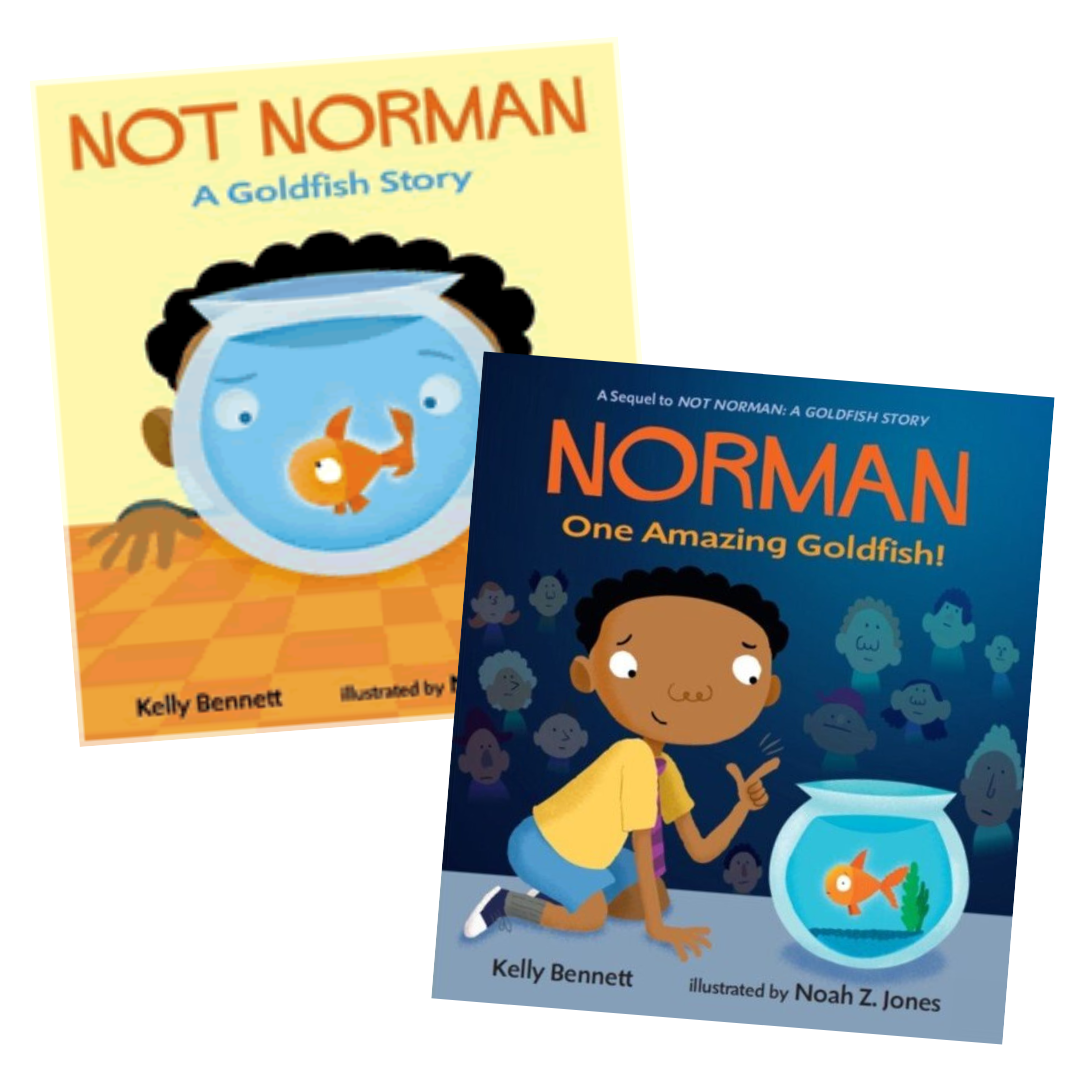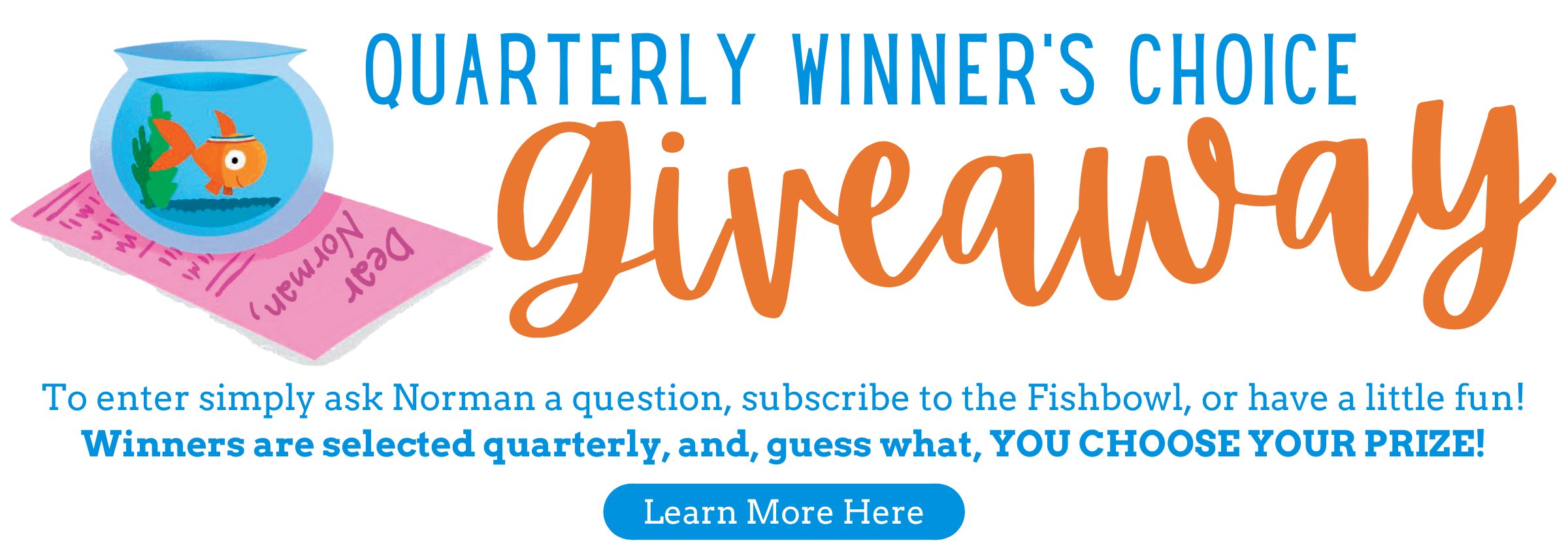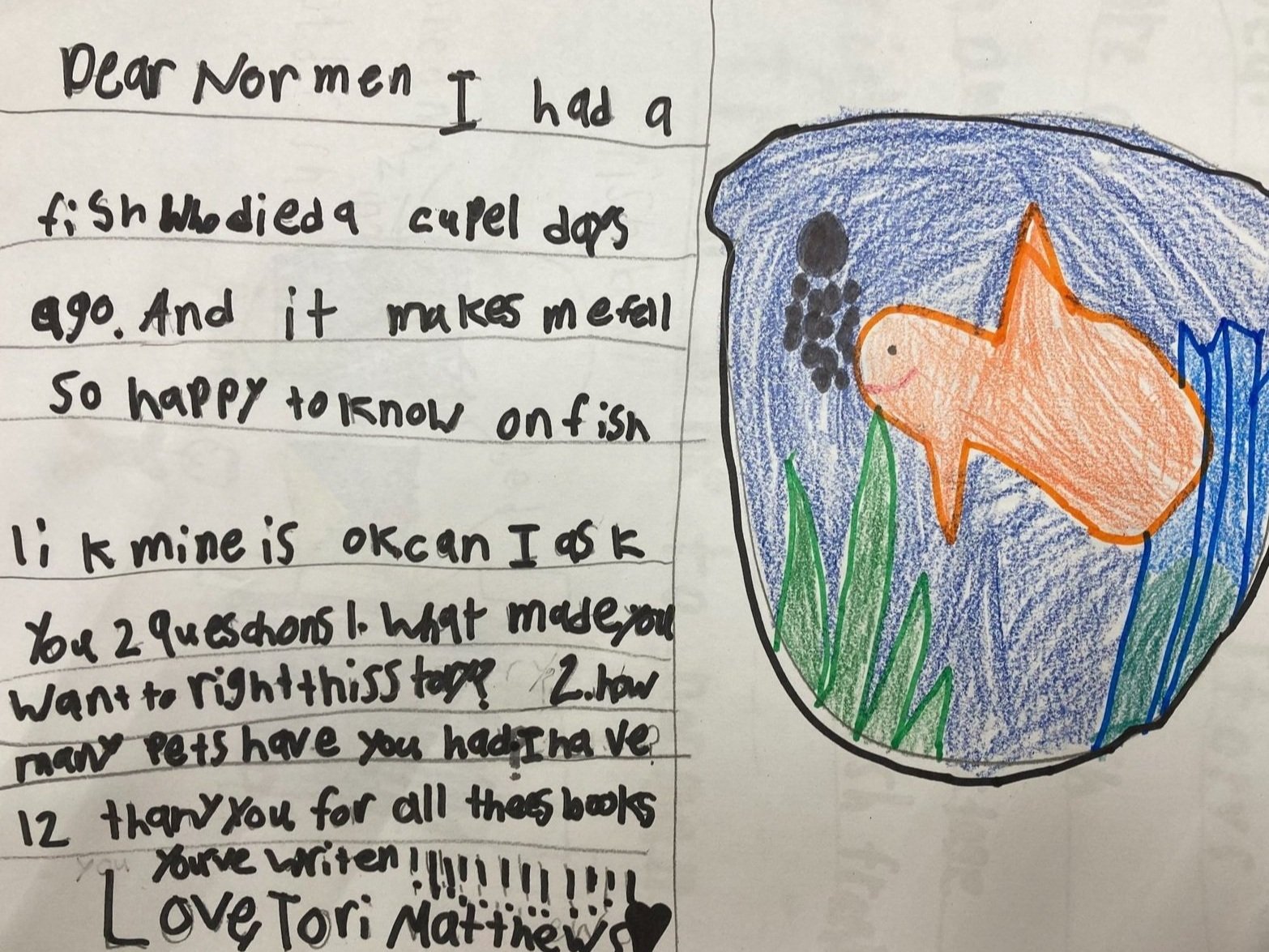Fin Pal asks Norman Fishy Christmas Jokes!
Happy Holidays! We have presents for you!
Below are 5 of Norman’s Finniest Christmas Jokes. Can you guess the answers?
Some of them are real sinkers so get ready. . .
Q: What is Whale Santa’s official greeting?
Scroll down for the answer . . .
Glug
Glug
Glug . . .
A: Blow-Blow-Blow
Q: Who brings good-little goldfish Christmas presents?
Scroll down for the answer . . .
Glug
Glug
Glug . . .
A: Sandy Claws
Q: What do goldfish sing over the holidays?
Scroll down for the answer . . .
Glug
Glug
Glug . . .
A: Christmas Corals
Q: What do goldfish use to tie Christmas bows?
Scroll down for the answer . . .
Glug
Glug
Glug . . .
A: Ribbon Eels
Q: What is Norman’s favorite Christmas Song?
Scroll down for the answer . . .
Glug
Glug
Glug . . .
A: We Fish You a Merry Christmas!
Happy Fishmas and Merry New Year from the Fishbowl!
Do you have a question for Norman the Goldfish- about friends, school, pets, family, life in and outside the fishbowl? Send him a letter!
Don’t forget to order your copy of NOT NORMAN: A GOLDFISH STORY and NORMAN: ONE AMAZING GOLDFISH!!
Poetry Challenge #275-Unfettered and Alive
I want to be free! Free to be! Born Free! or, if you live in New Hampshire, Live Free or Die! And thanks to Gustave Kahn, we can write free…verse!
Gustave Kahn (born Dec. 21, 1859, Metz, France—died Sept. 5, 1936, Paris), was a French poet and literary theorist who claimed to be the inventor of vers libre “free verse”.
“Vive vers libre!”
French poetry at the time had very rigid rules including the number of syllables on a line and the way the poem needed to rhyme.
Kahn’s free verse poetry however, used phrases as the basic unit to measure a line which meant the number of words or syllables could be different on each line. Each verse was a complete sentence, and the use of rhyme was optional. Here is one of Gustave Kahn’s poems entitled Three Girls on the Sea-Shore:
Poetry Challenge #275
Unfettered and Alive!
For today’s poem throw off those poetic shackles, because thanks to Gustave Kahn we can, and write freely about . . .
Freedom!
Think back on a time when you were totally and completely free—unfettered and alive a Joni put it in the song I Was a Free Man in Paris. What does that freedom feel like, taste like, smell like?
Write a free verse poem about Freedom.
Each line should contain a phrase or two and use one complete sentence for each verse. You can rhyme or not, as you choose.
Set Your Timer for 7 Minutes
Start Writing!
Don’t Think About it, Write It!
Cindy Faughnan and I began this 7-Minute Poetry Challenge 2400+ days ago. Now we take turns creating prompts to share with you. Our hope is that creatives—children & adults—will use our prompts as springboards to word play time. If you join us in the Challenge, let us know by posting the title, a note, or if you want, the whole poem in the comments.
Click on Fishbowl link and sign up to receive email notifications from Kelly's blog (aka The Fishbowl):
All who subscribe, comment or share a poem will be entered in . . .
Fin Pal Tori asks Norman "How About Pets?"
Isn’t Tori’s letter and picture fintastic! Ready to read Norman’s answer? Scroll down . . .
Glug
Glug
Glug . . .
But first a finny!
Q: What did one candlefish say to the other candlefish?
Q: What did one candlefish say to the other candlefish?
A: Want to go out tonight?
Do you have a question for Norman the Goldfish- about friends, school, pets, family, life in and outside the fishbowl? Send him a letter!
Don’t forget to order your copy of NOT NORMAN: A GOLDFISH STORY and NORMAN: ONE AMAZING GOLDFISH!!
Poetry Challenge #274-Carolyn Rogers, Gave this World
Today we celebrate poet Carolyn Marie Rodgers, born in 1940 in Chicago. Rogers, who died from cancer in April 2010, often performed her poetry in coffeehouses—dramatic, passionate readings (I’ve included a video below so you can see and hear her yourself, after). The themes of her work included feminism, the role of Black women, relationships, and love.
In her early career, Rogers studied with Gwendolyn Brooks and Nikki Giovanni. She wrote many books of poetry and was a finalist for the National Book Award in 1976 for how I got ovah: New and Selected Poems (1975).
“Between 1968 and 1978 I never believed that any female or male poet was any more crafted or gifted as Carolyn Rodgers. That is a fact.”
Here is the first section of Carolyn Rogers’ poem entitled Affirmation
Poetry Challenge #274
I Gave This World . . .
Affirmations are recognizing the good things, being supporting or encouraging.
A monologue is a long speech by one person.
Now, write an affirmation monologue of your own. If you want, begin the way Carolyn Rodgers did:
I gave this world…
Set Your Timer for 7 Minutes
Start Writing!
Don’t Think About it, WRITE IT!
Cindy Faughnan and I began this 7-Minute Poetry Challenge 2400+ days ago. Now we take turns creating prompts to share with you. Our hope is that creatives—children & adults—will use our prompts as springboards to word play time. If you join us in the Challenge, let us know by posting the title, a note, or if you want, the whole poem in the comments.
Click on Fishbowl link and sign up to receive email notifications from Kelly's blog (aka The Fishbowl):
All who subscribe, comment or share a poem will be entered in . . .
Wyatt asks Norman "How's About a New Story?"
Ready to read Norman’s answer? Scroll down . . .
Glug
Glug
Glug . . .
But first a finny!
Q: What does a parrot fish say?
Q: What does a parrot fish say?
A: Polly wants an oyster cracker!
Do you have a question for Norman the Goldfish- about friends, school, pets, family, life in and outside the fishbowl? Send him a letter!
Don’t forget to order your copy of NOT NORMAN: A GOLDFISH STORY and NORMAN: ONE AMAZING GOLDFISH!!
Poetry Challenge #273-Akiko Yosano
There are days when I do not want to write a poem—because I don’t want to do the thinking that goes into choosing a topic or form or emotion or or or…Those days Haiku is our default. Haiku is one of the first poetry forms students learn because it’s short: 3 lines, rules are specific: 17 syllables 5-7-5, and the topic preset: nature. Even better, as Cindy taught me: singing the beginning of Moonlight in Vermont sets the Haiku rhythm.
Before Haiku there was the Tanka. A tanka is a 5-line 31-sylable poem that is actually 2 poems. The first being a complete haiku—in which the “nature” is often more human based. The second poem portion of a tanka is a response or reflection on the first.
“snow and stars shine on her disheveled hair; ginkgo leaves scatter in the sunset; the nightingale sleeps with doubled-up jeweled claws.””
Tanka are more nuanced in ways that are unique to Japanese and difficult to discuss in English terms, for that reason, many of those published in English are translations from Japanese, especially the works of Akiko Yosano whose tanka incorporate vivid, sensual images and frank freshness that were startling—for their time, and especially coming from a woman—and still surprising and evocative today.
Akiko Yosano, born on Dec. 7, 1878, is the pen name of this Japanese author, poet, pioneering feminist, pacifist, and social reformer. Her real name was Yosano Shiyo, “Ho Sho.” Akiko began writing poetry in high school and published her first volume of poetry in her early 20s, entitled Midaregami (Tangled Hair), the collection included 400 tanka poems. Before her death in 1942, Akiko published about 20 volumes of Tanka. Here are translations of a few of her poems:
Poetry Challenge #273
Tanka Like Akiko
In honor of Akiko Yosano, let’s try our pens at creating a tanka with a theme of love, passion, life.
Tanka are five-lines long with a set number of syllables in each line: 5-7-5-7-7. They consist of 2 parts that are actually more like two separate poems. The first poem is a 3-lines of 17 syllables, with 5 syllables in the 1st line, 7 in the second and 5 in the third. The 2nd poem has two 7 syllable lines.
Begin by creating the first poem incorporating nature to create a metaphor or simile to describe a human or human trait.
The last 2 line poem respond to/reflect upon the first part.
Once the two poems are created, complete the poem by rework the 3rd line of the haiku to include engo (en-goh): words act as a binder between the upper and lower poem to help connect the two parts and complete the tanka.
Set Your Timer for 7 Minutes
Start Writing!
Don’t Think About it, Tanka!
Cindy Faughnan and I began this 7-Minute Poetry Challenge 2400+ days ago. Now we take turns creating prompts to share with you. Our hope is that creatives—children & adults—will use our prompts as springboards to word play time. If you join us in the Challenge, let us know by posting the title, a note, or if you want, the whole poem in the comments.
Click on Fishbowl link and sign up to receive email notifications from Kelly's blog (aka The Fishbowl):
All who subscribe, comment or share a poem will be entered in . . .
Fin Pal asks Norman "Do you sleep at night?"
Xujan-Mei’s underwater watercolor is fintastic! And look! He drew himself inside the diving suit!
All the cool blue makes it sort of hard to read the questions, so they are:
Do you sleep at night time?
In the world, what is your favorite color?
What do you think? Do goldfish sleep?
Ready to read Norman’s answer? Scroll down . . .
Glug
Glug
Glug . . .
But first a finny!
Q: Where do goldfish sleep at night?
A: Where do goldfish sleep at night?
Q: In riverbeds
Want to learn more cool facts about goldfish sleeping? Click over to AquariumGenius.
Do you have a question for Norman the Goldfish- about friends, school, pets, family, life in and outside the fishbowl? Send him a letter!
Don’t forget to order your copy of NOT NORMAN: A GOLDFISH STORY and NORMAN: ONE AMAZING GOLDFISH!!
Poetry Challenge #272-John McRae's Legacy
“In Flanders fields the poppies blow…”
The red poppy is the symbol of remembrance worn to honor fallen soldiers because of a poem written by John McCrae, a Canadian doctor and poet born on November 30, 1872.
During World War 1, McCrae served as brigade-surgeon to the First Brigade of the Canadian Field Artillery which, in April 1915, was involved in the Second Battle of Ypres, a horrifically bloody fight during which about 87,000 people lost their lives.
The following day, McCrae noticed the wild poppies blooming in the fields of makeshift graves and was moved to write the poem “In Flanders Field,” written from the point of view of the fallen soldiers.
The poem, published in Punch Magazine, that Dec 1915, was hugely popular and very soon therein, the red poppy was adopted as the memorial flower.
Poetry Challenge #272
Leave Taking
Imagine someone is leaving.
Write a poem from that person’s point of view. In the poem, discuss what might happen after they are gone.
Focus on one specific thing they will miss about the place. Or perhaps that will not be missed.
Set Your Timer for 7 Minutes
Start Writing!
Don’t Think About it, just write It!
Cindy Faughnan and I began this 7-Minute Poetry Challenge 2000+ days ago. Now we take turns creating prompts to share with you. Our hope is that creatives—children & adults—will use our prompts as springboards to word play time. If you join us in the Challenge, let us know by posting the title, a note, or if you want, the whole poem in the comments.
Click on Fishbowl link and sign up to receive email notifications from Kelly's blog (aka The Fishbowl):
All who subscribe, comment or share a poem will be entered in . . .



































